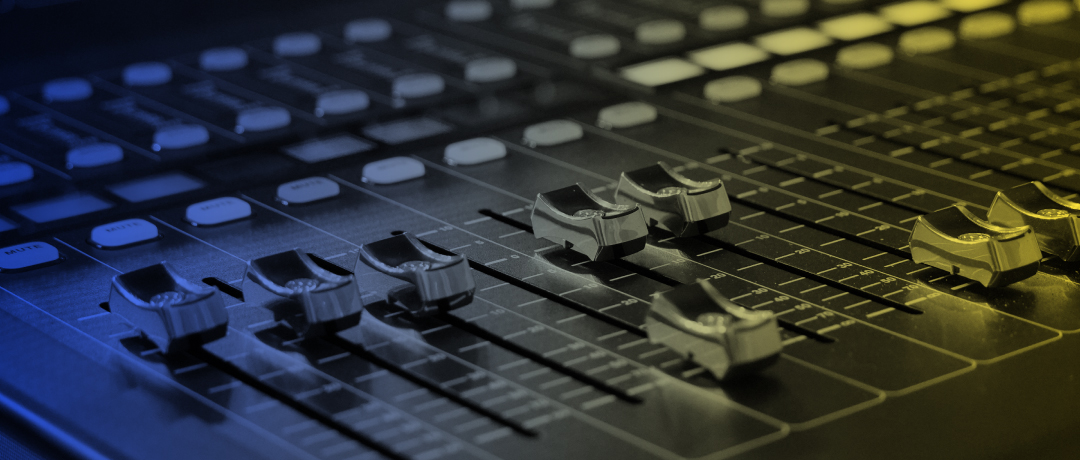Blog | Should You Be Recording Your Worship Rehearsals?

Should You Be Recording Your Worship Rehearsals?
If you’ve upgraded your mixing console in the past 10 years, it’s most likely a digital desk. And while a new sound board isn’t going to magically make anyone better at singing, playing an instrument, or mixing, here’s something you can do that has the potential to directly impact the quality of your musicians and techs:
Record Your Rehearsals
How often do you change the arrangement of a song from the recorded version? If you’re like me, the answer is almost weekly. Do you struggle with giving helpful feedback about feel and tone to your players? If you’re on stage each week, but you’re responsible for the performance of the tech team as well, it can be difficult to assess how your sound engineers are doing if all you ever hear is your monitor mix.
Rehearsal recordings can be the perfect tool to help solve all of these challenges.
Listen Back to Changes
Maybe you’ve always played “Good, Good Father” the same way, but you want to change up the arrangement, or maybe you’re doing an acoustic version of a song you typically play with a full band. Whatever the reason, every worship band is putting their own spin on popular songs each week. For a lot of musicians, two or three times through the song at rehearsal isn’t enough to break the muscle memory of playing it as recorded, or as played in the past. Recording rehearsals and making those recordings available allows your team to go back and practice with a recording that actually represents how you’ll play the song on Sunday.
This becomes especially helpful if you add complicated transitions or solos. Musicians will almost always be able to recall the changes while talking through the song, but being able to hear them in context will help galvanize the new version in their brains and fingers.
You don’t need a complicated recording set-up for this to be effective. You can even set up an iPhone at the sound booth and record a voice memo. This may be less helpful for giving individuals specific feedback or gauging your mix, but it captures transitions and arrangements for band members to reference.
A Useful Tool for Giving Feedback
Have you ever finished running through a song in rehearsal and thought “something doesn’t sound right, but I can’t put my finger on it”. Or maybe you were too focused on playing your own part that you didn’t notice that your guitar player’s tone is not the right sound for this song. Referencing your rehearsal recordings can give you incredibly helpful insight as to how each of your musicians are doing. Of course, most musical issues should be addressed in rehearsal, but broader conversations can and should be happening with your team about how each of us can be improving.
You may listen back and realize that your keyboard player simply needs to play more confidently, or your bass player needs to be less busy. Having the rehearsal recording on hand is a game changer in these conversations – it allows you to reference your band and compare your performances to the original recordings you’re working from.
When giving this kind of feedback, there are a couple of things to keep in mind. First, maintain reasonable expectations for your musicians. If you’re leading a volunteer band, be selective with how you compare their playing to professional recordings. The goal here is progress, not perfection. Most “live” worship albums are made mostly in a studio, so sounding just like them isn’t a realistic goal. Use specific examples to speak to broad principles. When your bass player plays during quiet moments in songs when they shouldn’t, point to the difference in feel between your rehearsal recording and the reference track, for example.
Second, know the difference between a missed note and a pattern that needs to be addressed. If your bass player flubs a couple of notes, that’s probably just a mistake, and they’re likely very aware of it. If the same mistake happens in the same part of the chorus every time you play it, you’ll want to check in and make sure they know what the correct part is.
Mixing Without a Band
The most involved application of recording rehearsals probably has the most immediate impact on your Sunday service. If you’re mixing with a digital console, and have a powerful enough computer, you can record your rehearsal with individual tracks for each instrument and microphone. After rehearsal, or early on Sunday before the band comes back in, your sound engineer can pull up that session in your recording software, and tweak the mix without the band present. All you’ll need is the tracks recorded at rehearsal.
Depending on the size of your room and the amount of stage volume you have, this may not be helpful for finalizing your overall balance. Live drums and guitar amps on stage add a lot to your overall mix, so just playing back your recording won’t capture everything you get in the room.
Something invaluable that you can do, though, is really dial in your EQ’s and Dynamics. Being able to solo a track allows you to carve out some of the harsh frequencies and make mesh with the rest of the mix. You can get your compressors and gates just right, and ready to go on Sunday.
If you stream your services, this is the perfect time to refine your stream mix as well. Beyond preparing for Sunday morning, this allows you the chance to hear some of what your sound engineer is hearing and learn from them, or give some constructive feedback.
Sound overwhelming? Just start with one small step. Make it as simple as putting a phone in the back of the room or recording directly to a flash drive on your console. Regardless of how you choose to go about recording your rehearsals, there’s a lot to gain from it, and almost nothing to lose (except a few GB of storage on your computer).

About the Author
Emma Tarp is a writer and worship leader based in Minneapolis, MN. On her best days, she's highlighter-deep in a good book or teaching herself to sew. On her other best days, she's helping passionate folks and inspired businesses put words to their work. Find out more at emmatarp.com.

Totally agree. Besides a benefit to the band, it’s also a great way to raise up volunteers from the audio production side as it gives them and opportunity to learn and try out the process in a safe environment.